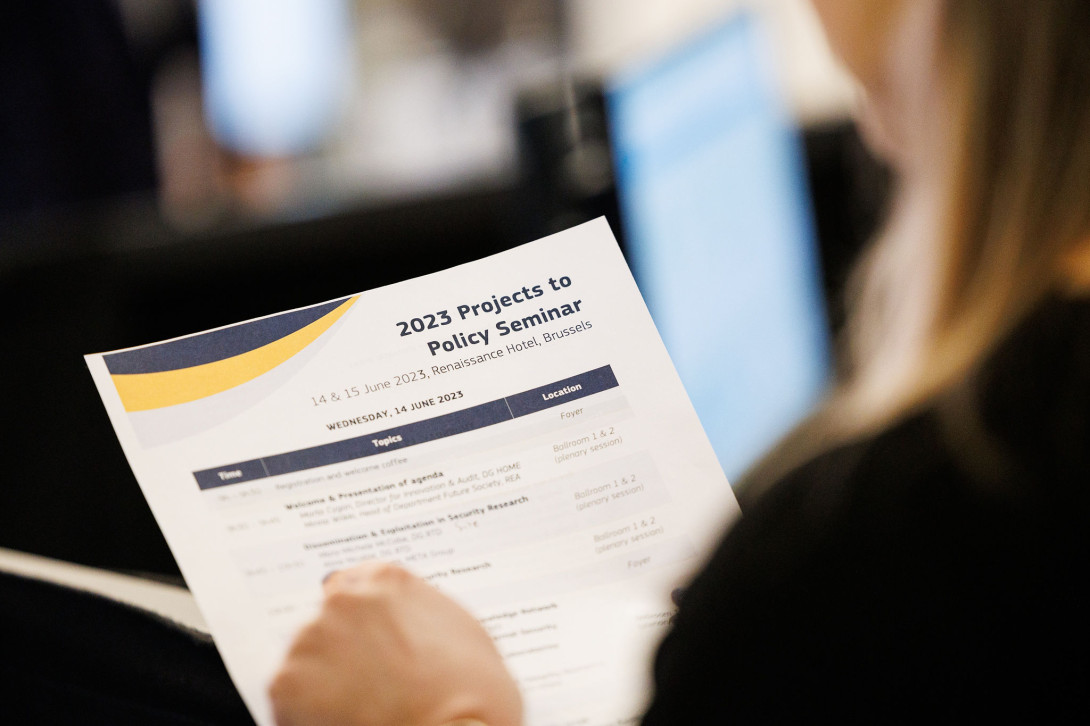
On June 14-15 2023, the European Commission held the Projects to Policy Seminar 2023 in Brussels, bringing together EU policymakers, project officers and project managers. The seminar was a great opportunity to learn more about the work the EU is doing on the policy side of domestic security and to get to know the policy and project officers as well as colleagues working on other projects that were recently funded under the Horizon framework.
FERMI was represented by three consortium partners: Sven-Eric Fikenscher from the Bavarian Police Academy and coordinating partner of the project, Stella Meyer from the Lisbon Council, the consortium's dissemination manager, and Spyros Evangelatos from Netcompany-Intrasoft SA, one of the technical partners in FERMI. Divided into four thematic groups, participants were asked to briefly introduce their projects. Breakout groups included “Fighting Crime and Terrorism, including Resilient Infrastructure”, where FERMI was presented, “Disaster Resilient Societies”, “Border Management”, and “Strengthening Research and Innovation”. After the introductions, the groups discussed issues faced within their projects and shared best practices as well as expertise on the various thematic areas including disinformation.
Presenting the FERMI project
As representatives of FERMI, we emphasised the growing challenges posed by disinformation actors, particularly those of violent extremists. These actors take advantage of available and emerging technologies, notably social media and AI, to spread false and misleading narratives, thereby encouraging illegal activities and at times even inciting violence. FERMI is developing tools to help law-enforcement agencies (LEAs) address and mitigate these threats. More specifically, enabling LEAs to distinguish between social media accounts operated by bots versus those operated by real persons. The latter can then be investigated against if and when they post illegal messages. Further, FERMI seeks to help LEAs better understand the spread of disinformation narratives and campaigns on social media in order to identify perpetrators and collect evidence.
Another tool which is currently being developed aims to predict the type, time and location of criminal offences occurring amidst the dissemination of disinformation that violate the law. Other tools are used to examine community resilience and community-specific threats, including by providing cost estimates, to assess the sentiment of social media posts, and to support the exchange of information amongst LEAs. One of our challenges in developing these tools is access to data, particularly social media data. While data access is generally tricky, the issue has been exacerbated since platforms like Twitter have restricted access to their API. This was echoed by many other projects that are also dependent on access to such data. Exploitation possibilities are huge, considering that the above-mentioned tools cover a lot of ground by enabling LEAs to embark on numerous steps to analyse and counter disinformation-induced violations of the law. Moreover, some of the tools may also be used in other security areas such as border management, if adapted to the environment and challenges at stake.
Outcomes
Besides the project presentations and discussions, the PPS included several insightful sessions on dissemination and exploitation, innovation uptake and communication. Moreover, various EU networks and agencies presented themselves and their work in domestic security research. The PPS served as a valuable platform to connect with fellow projects, explore potential areas of collaboration and learn from each other. It also allowed us to speak to policymakers directly to understand how they work, what they need and expect from our side and vice versa. Projects like FERMI are only sustainable if the research results are fed into actionable policies. Attending the PPS was an important step in that direction. The FERMI consortium will present their work in further expert gatherings like the upcoming Security Research Event 2023 to deepen the dialogue between fellow consortia, security experts and policymakers.